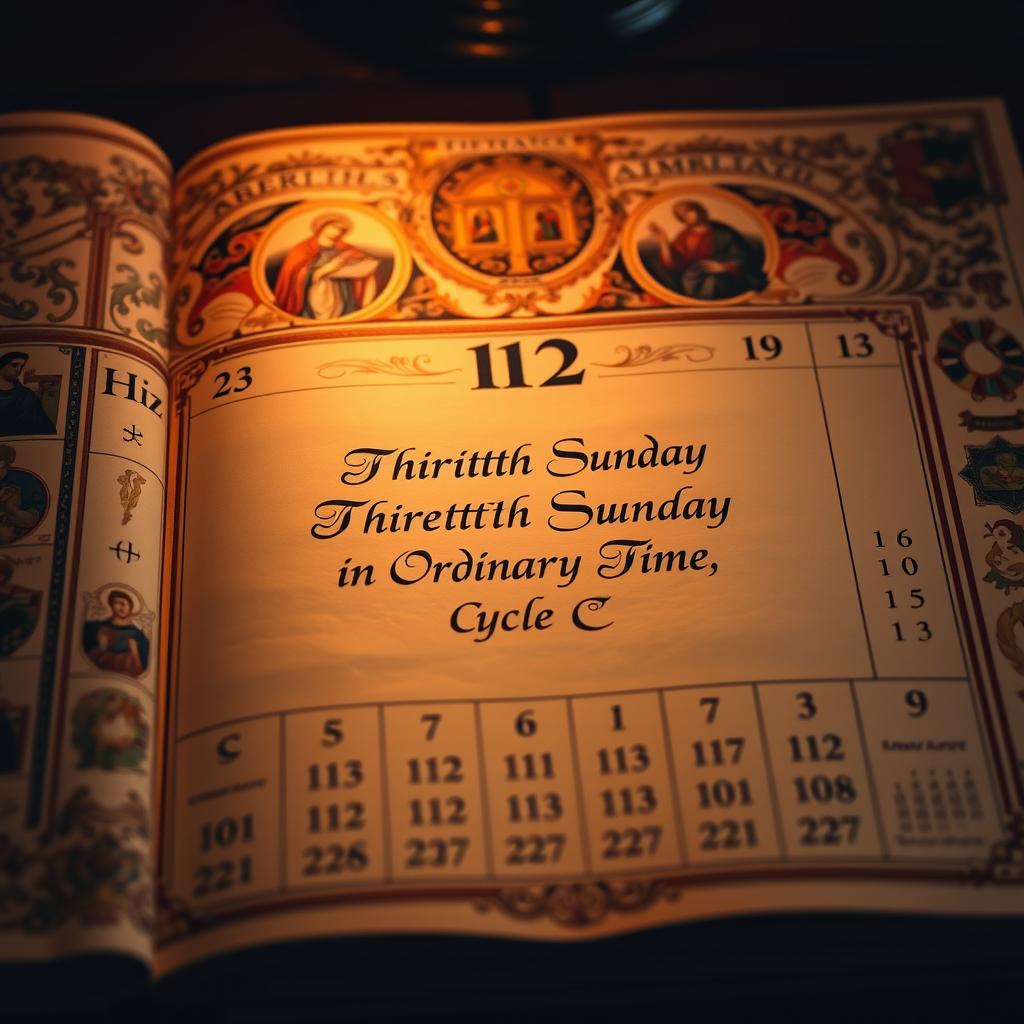Reflecting on the liturgical calendar, I find the Thirtieth Sunday in Ordinary Time, Cycle C very significant. It highlights the importance of humility, prayer, and staying strong in faith.
The readings from Sirach 35:12-14, 16-18, Psalm 34:2-3, 17-18, 19, 23, 2 Timothy 4:6-8, 16-18, and Luke 18:9-14 weave together beautifully. The parable of the Pharisee and the tax collector in Luke 18:9-14 teaches us a valuable lesson. It shows us how crucial humility is when we pray.
As we move through the liturgical calendar, the Thirtieth Sunday in Ordinary Time, Cycle C gives us a chance to dive deeper into our faith and prayer.
Key Takeaways
- Understanding the significance of humility in prayer.
- Exploring the themes present in the readings for the Thirtieth Sunday.
- Reflecting on the importance of perseverance in faith.
- Gaining insights into the liturgical calendar and its relevance.
- Analyzing the parable of the Pharisee and the tax collector.
Understanding the Thirtieth Sunday in Ordinary Time
In the Catholic Church, the Thirtieth Sunday in Ordinary Time is very important. It’s part of the liturgical calendar. This calendar is filled with themes that guide the faithful all year long. Each Sunday has its own special focus.
The Significance in the Liturgical Calendar
The Thirtieth Sunday in Ordinary Time falls in the Ordinary Time part of the calendar. It’s a time to explore Jesus Christ’s life and teachings. This Sunday is key because it helps believers think about prayer, humility, and God’s justice.
Cycle C and Its Focus
Cycle C of the Sunday mass readings comes from the Gospel of Luke. The Thirtieth Sunday in Ordinary Time, Cycle C, deals with prayer and humility. It’s important to understand these readings to appreciate the Catholic Church‘s liturgical practices.
The Theme of Humility and Prayer
Reflecting on the Thirtieth Sunday in Ordinary Time, Cycle C, we find a deep theme. It’s about humility and prayer. The liturgical calendar gives us a chance to dive into the scriptures. It helps us understand their role in our spiritual journey.

Connecting the Readings
The readings from Sirach, 2 Timothy, and the Gospel of Luke all talk about humility and prayer. They offer a rich mix of insights. In Sirach, we learn that God listens to the humble. This idea is also in Luke’s parable of the Pharisee and the tax collector, showing the value of humility in prayer.
The second reading from 2 Timothy adds more depth. Paul’s thoughts on his life and ministry highlight the importance of perseverance and humility. These readings together push us to be humble and pray sincerely.
Central Message for Believers
The main message is clear: true spiritual growth comes from humility and sincere prayer. As we move through the liturgical year, we’re encouraged to think about our prayer and humility. We’re urged to find ways to deepen our faith.
In our personal reflection or homily, we can see how these themes apply to us today. Embracing humility and sincere prayer leads to spiritual growth and a closer bond with God. This reflection helps us live a more genuine and meaningful faith.
Reading 1: Sirach 35:12-14, 16-18 Overview
Sirach 35:12-14, 16-18 is the first reading for the Thirtieth Sunday in Ordinary Time, Cycle C. It talks about prayer and humility. This passage is from the book of Sirach, also known as Ecclesiasticus. It’s a key part of the Catholic Bible’s wisdom literature.

Historical Context of Sirach
The book of Sirach was written around 180 BCE by Jesus Ben Sirach, a Jewish scribe. It’s a collection of teachings and wisdom sayings. These are meant to guide Jews in their faith and daily life. Knowing its history helps us see how relevant Sirach 35:12-14, 16-18 is for sunday mass readings.
Key Verses Explained
The chosen verses stress the importance of sincere prayer. They say God listens to the prayers of the righteous. Sirach 35:12-14 warns against fake prayers or bribes. It tells us God values the quality, not the quantity, of our prayers.
Verses 16-18 explain that God hears the prayers of the humble. He will act quickly for them. This reading matches the gospel readings by showing the importance of humility and true faith.
Reflecting on Sirach 35:12-14, 16-18 teaches us to pray with a sincere heart. This message is key to the sunday mass readings and gospel readings all year.
God’s Justice and Impartiality in Sirach
The book of Sirach offers deep insights into God’s justice and fairness. These themes are key to the Catholic Church’s teachings. It shows how divine justice is vital for believers, highlighting God’s dedication to fairness and righteousness.
The Lord as Judge
Sirach describes the Lord as a fair judge who listens to the faithful. This is shown in Sirach 35:12-14, which says God quickly answers the prayers of the righteous.
“The Lord is a just judge, and there is no injustice with him.” This quote highlights God’s fairness.
Divine Response to Prayer
The book of Sirach also talks about God’s response to prayer. It shows that divine justice is connected to human life. God’s answer to prayer shows His deep care for the faithful.
| Aspect of Divine Justice | Description |
|---|---|
| Impartiality | God shows no favoritism, judging each case on its merit. |
| Response to Prayer | God hears and responds to the prayers of the righteous. |

In conclusion, Sirach paints a vivid picture of God’s justice and fairness. It supports the Catholic Church’s teachings on prayer and religious observance.
The Cry of the Lowly in Sirach
In the book of Sirach, the cry of the lowly is a powerful theme. It shows God’s care for those who are overlooked. This theme helps us understand spiritual growth through recognizing God’s justice and compassion.

God’s Special Concern for the Marginalized
Sirach says God listens closely to the prayers of the lowly. It points out God’s fairness and kindness, showing God’s attention to those society often ignores.
The book urges us to think about our connection to the marginalized. It encourages us to show God’s care for them. This way, we can grow spiritually and build stronger communities.
Applications for Modern Faith
Today, Sirach’s message guides us to help the marginalized. We can do this by volunteering, fighting for justice, and being there for those in need.
| Action | Impact |
|---|---|
| Volunteering | Directly serving the marginalized |
| Advocacy | Promoting justice and equality |
| Being Present | Offering emotional and spiritual support |
By taking these steps, we deepen our faith and its role in the world.
Responsorial Psalm: Psalm 34:2-3, 17-18, 19, 23
The Responsorial Psalm for the Thirtieth Sunday in Ordinary Time, Cycle C, is Psalm 34. It’s a powerful expression of thanksgiving and trust in God’s deliverance. This psalm is a key part of the Sunday Mass readings, linking the liturgical calendar to the spiritual life of believers.
Structure and Background
Psalm 34 is attributed to David, showing his experiences and emotions as he sought God’s protection. The psalm is an acrostic poem, with each verse starting with a successive letter of the Hebrew alphabet. This structure highlights God’s complete and perfect salvation.
The selected verses (2-3, 17-18, 19, 23) for the Responsorial Psalm focus on praise, God’s response to the righteous, and redemption. These verses are crucial for understanding the psalm’s message and its importance in the liturgical celebration.
Musical and Liturgical Significance
The musical rendition of Psalm 34 during the Sunday Mass adds to its liturgical significance. It creates a communal expression of faith and worship. The psalm’s melody and rhythm encourage the congregation to participate actively in the liturgy, fostering unity and shared devotion.
| Verse | Theme | Liturgical Significance |
|---|---|---|
| Psalm 34:2-3 | Praise and Thanksgiving | Opening the liturgical celebration with a note of gratitude |
| Psalm 34:17-18 | The Lord’s Response to the Righteous | Emphasizing God’s attentiveness to the faithful |
| Psalm 34:19, 23 | Redemption and Faithfulness | Concluding with trust in God’s deliverance and redemption |

In conclusion, Psalm 34, as the Responsorial Psalm for the Thirtieth Sunday in Ordinary Time, Cycle C, enriches the liturgical calendar. It deepens the congregation’s understanding of God’s salvation and their response in faith and worship.
The Lord Hears the Cry of the Poor
The Responsorial Psalm, Psalm 34, talks about God’s attention to the righteous and the poor. It shows our trust in God’s justice and mercy.

Themes of Divine Attentiveness
The psalmist says, “The Lord is close to the brokenhearted; and those who are crushed in spirit he will save” (Psalm 34:18). This verse shows God’s closeness to those who suffer. It tells us he is ready to save them. The idea of God’s attention is key in the psalm, making us feel God is always with us.
Connection to Sirach’s Message
Sirach and the Responsorial Psalm share a common message. They say God listens to the faithful, especially the poor and the righteous. Sirach tells us God is a fair judge, not biased (Sirach 35:12). This supports the idea that God’s justice is fair and equal. It teaches us to pray with trust and respect.
In the Catholic Church, this theme is vital. It reminds us of the value of prayer and trusting in God’s care. As we think about these readings, we’re called to grow our faith. We should also learn from the humility and trust shown by the psalmist and Sirach.
Reading 2: 2 Timothy 4:6-8, 16-18 Overview
The second reading for the Thirtieth Sunday in Ordinary Time, Cycle C, comes from 2 Timothy 4:6-8, 16-18. It gives us a deep look into Paul’s final words. This part of the Pastoral Epistles is a set of letters from Paul. They guide and uplift early Christian leaders.

Paul’s Final Testament
In 2 Timothy 4:6-8, 16-18, Paul looks back on his life and work. He feels complete and fulfilled. He says, “‘I have competed well; I have finished the race; I have kept the faith” (2 Timothy 4:7).
This shows Paul’s strong commitment to his mission. He’s confident, even when things get tough.
Paul’s words are not just for himself. They’re a message of hope and perseverance for Timothy and the early Church. He stresses the value of staying true to faith, no matter what.
Historical Context of the Letter
2 Timothy is thought to be one of Paul’s last letters. He wrote it while in prison in Rome, waiting for his trial. Knowing he might soon die, Paul’s words carry a deep sense of urgency and importance.
The letter tackles issues in the early Church, like false teachings and the need for solid doctrine. Paul’s advice to Timothy helps guide leaders and care for the flock in the Church.
Reflecting on 2 Timothy 4:6-8, 16-18 in the Sunday Mass readings reminds us of the lasting message of faith, perseverance, and the need to stay committed to our spiritual path.
Paul’s Reflection on His Life and Ministry
In his writings, Paul often reflects on his ministry. He uses the metaphor of a race to describe his journey. This reflection shows his faith and dedication to the Gospel.
The Race Completed
Paul reflects on his life’s work in his statement, “I have fought the good fight, I have finished the race, I have kept the faith” (2 Timothy 4:7). This race metaphor shows the end of a journey and the fulfillment of a divine calling.
Reflecting on Paul’s words, we see the value of perseverance and faithfulness. His example motivates us to run our own race with dedication and hope.
The Crown of Righteousness
Paul looks forward to receiving “the crown of righteousness” (2 Timothy 4:8). This shows his confidence in God’s justice and mercy. The crown is not just a reward but a symbol of God’s approval and grace.
“For I am already being poured out like a drink offering, and the time of my departure is near. I have fought the good fight, I have finished the race, I have kept the faith.” – 2 Timothy 4:6-7
Reflecting on Paul’s life and ministry, we learn about perseverance, faithfulness, and divine grace. These themes are not just for Paul but inspire believers today.

| Theme | Paul’s Reflection | Relevance to Believers |
|---|---|---|
| The Race Completed | Fulfillment of divine calling | Encouragement to persevere |
| The Crown of Righteousness | Symbol of God’s approval and grace | Inspiration for faithfulness |
Divine Deliverance in Times of Trial
Reflecting on 2 Timothy, we see Paul’s strong faith in God’s help, even when left alone. This idea of divine deliverance is key to the Catholic Church’s views on growing spiritually.
Paul’s Experience of Abandonment
Paul’s story of being left behind shows his deep faith. In 2 Timothy 4:16-18, he talks about being abandoned by all, yet God was with him, giving him strength. This shows how important it is to trust in God’s help when we face hard times.
The Lord’s Faithfulness
The Bible often talks about God’s faithfulness, giving hope and comfort to believers. Paul’s story shows that God’s help isn’t just about avoiding problems. It’s also about being strong and empowered through them.
| Key Elements | Description |
|---|---|
| Paul’s Abandonment | Paul was forsaken by everyone during his trial. |
| The Lord’s Intervention | The Lord stood by Paul and gave him strength. |
| Spiritual Growth | Paul’s experience teaches us to trust in God’s deliverance for spiritual growth. |

In conclusion, Paul’s story of divine deliverance in hard times is a powerful lesson from the Catholic Church. By trusting in God’s faithfulness, we can face challenges with confidence.
Thirtieth Sunday in Ordinary Time, Cycle C: Gospel Reading
In this Sunday’s Gospel, Jesus teaches us about humility and prayer. He uses the parable of the Pharisee and the tax collector to show us the way.

Luke 18:9-14 in Context
The parable of the Pharisee and the tax collector is a key part of this Sunday’s Gospel. It’s found in Luke 18:9-14. Jesus tells a story to show the difference between self-righteousness and humility.
This parable fits into Jesus’ teachings on the Kingdom of God. It highlights the values God sees as important.
Literary Structure and Style
The parable is simple and easy to understand. Jesus uses it to teach a vital lesson about true righteousness.
| Character | Action | Significance |
|---|---|---|
| Pharisee | Prays self-righteously | Illustrates self-righteousness |
| Tax Collector | Prays humbly | Exemplifies humility |
The contrast between the two characters teaches us a lesson. Jesus says, “everyone who exalts himself will be humbled, and the one who humbles himself will be exalted.”
Reflecting on this Gospel, we’re called to look at our prayer and righteousness. We should think about how we can show humility like the tax collector.
The Parable of the Pharisee and the Tax Collector
Jesus’ parable about the Pharisee and the tax collector shows a big difference between pride and humility. This story, found in Luke 18:9-14, is great for thinking deeply and can be a key part of a sermon. It makes us question how we pray and see ourselves as righteous.
Characters and Their Significance
The Pharisee and the tax collector show two ways to believe in faith. The Pharisee is proud of his good deeds and looks down on others. On the other hand, the tax collector is humble, knowing he needs God’s mercy.
This story teaches us that humility is key in prayer. The tax collector’s humble prayer is seen as more righteous by God. It shows that true goodness comes from recognizing our need for God’s grace.
Jesus’ Teaching Method
Jesus teaches us through this parable about the kingdom’s values. He shows that the last are first and the humble are lifted up. By using real-life characters, Jesus makes the lesson clear and powerful. This way, he encourages us to think about our own beliefs and actions, helping us understand God’s will better.

Reflecting on this parable, I see how crucial humility is in my prayer life. It teaches me to come to God with a true heart.
True Righteousness vs. Self-Righteousness
The parable of the Pharisee and the tax collector teaches us about true righteousness. It shows that true righteousness is about humility, not self-justification. This lesson comes from the Gospel reading for the Thirtieth Sunday in Ordinary Time, Cycle C.

The Pharisee’s Prayer Analyzed
The Pharisee’s prayer shows self-righteousness. He boasts about his religious achievements, saying, “I give thanks that I am not like the rest of humanity” (Luke 18:11). This attitude is common in the Catholic Church, where people focus on outward actions more than their spiritual state.
Some key elements of the Pharisee’s prayer include:
- Self-justification through religious practices
- A sense of superiority over others
- A lack of acknowledgment of personal sin
The Tax Collector’s Humility
The tax collector, on the other hand, prays with humility. He says, “Have mercy on me, a sinner” (Luke 18:13). His prayer focuses on his need for God’s mercy, not his achievements. This humility is key for spiritual growth in the Catholic faith.
The tax collector’s humility is characterized by:
- Acknowledgment of his sinful state
- Recognition of his need for God’s mercy
- A humble posture before God
In conclusion, the parable teaches us that true righteousness is about humility and recognizing our need for God. As we grow spiritually in the Catholic Church, we should follow the tax collector’s example of humility.
Homiletic Approaches to These Readings
Looking at the scripture readings for the Thirtieth Sunday in Ordinary Time, Cycle C, shows us great opportunities. The texts from Sirach, 2 Timothy, and Luke’s Gospel are full of themes. These can be woven into a homily that means a lot.
Preaching Themes and Angles
One big theme in these readings is the value of humility and prayer. Sirach talks about God’s fairness and care for the poor. This idea is also in Luke’s parable of the Pharisee and the tax collector.
Jesus shows us that true goodness is not about being proud but humble. The second reading from 2 Timothy adds another view. It’s about Paul’s life and his hope for a reward.
Connecting Scripture to Modern Life
To link these scriptures to today, preachers can talk about humility and fairness. They can show how fighting for justice today relates to God’s fairness and care for the poor.
Social Justice Applications
Preachers can urge their people to think about how to help the poor and fight for justice. This is about growing spiritually and taking action together.
Personal Spiritual Growth
The readings also ask us to look at our prayer and humility. By being humble and sincere in prayer, we can grow closer to God.
![]()
Creating a homily for this Sunday is a chance to motivate people to live with humility, prayer, and justice. By thinking deeply about these readings, we can grow personally and work together for justice.
Liturgical Celebrations in American Parishes
Liturgical celebrations in American parishes show the faith and culture of the Catholic Church in the U.S. These events are key parts of the liturgical calendar. They add richness to religious observance through many traditions and practices.
Music Selections and Their Significance
Music is very important in liturgical celebrations. It makes worship more engaging and brings people together. The hymns and music chosen match the day’s theme and the readings.
For example, on the Thirtieth Sunday in Ordinary Time, Cycle C, the music might focus on humility and prayer. This matches the readings from Sirach, 2 Timothy, and Luke’s Gospel.
Ritual Elements and Symbols
Ritual elements and symbols are crucial in liturgical celebrations. Sacred vestments, liturgical vessels, and actions like breaking bread add to the liturgy’s beauty.
Cultural Adaptations
Cultural adaptations are key in American parishes. Using different musical styles, languages, and practices makes worship more inclusive and meaningful.
Community Participation
Community participation is encouraged through roles like lectors, altar servers, and choir members. This active involvement creates unity and shared purpose among parishioners.
| Element | Significance | Example |
|---|---|---|
| Music | Enhances worship experience | Hymns during the Thirtieth Sunday in Ordinary Time |
| Ritual Elements | Adds depth to liturgy | Sacred vestments and liturgical vessels |
| Cultural Adaptations | Makes liturgy inclusive | Incorporating diverse musical styles |
| Community Participation | Fosters unity | Lectors, altar servers, choir members |

Conclusion
Reflecting on the Thirtieth Sunday in Ordinary Time, Cycle C, shows us the value of humility, prayer, and perseverance. The readings from Sirach, 2 Timothy, and Luke’s Gospel give us insights into true righteousness. They also show how God listens to the prayers of the humble.
We are called to grow in humility and trust in God’s mercy. The story of the Pharisee and the tax collector teaches us. It shows that true growth comes from humility and recognizing our need for God’s grace.
Let’s keep moving forward in our faith journey. May the lessons from the Thirtieth Sunday inspire us to pray more deeply and stay committed to Christ. By embracing these themes, we can grow spiritually and live our faith more authentically.





